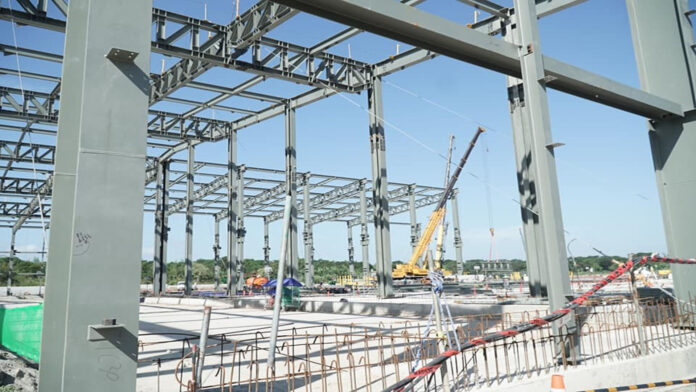The Philippines’ macroeconomic strength, enabling policy environment, and infrastructure development agenda are the “main reasons” foreign investors must consider in growing their businesses in the country, President Ferdinand R. Marcos Jr. said Friday.
During the Philippine Business Opportunities Forum in Tokyo, Japan, Marcos urged the Japanese investors and business leaders to continue nurturing their “mutually beneficial” partnership with the Philippines.
He proudly stated that the Philippines has demonstrated a “remarkable rebound” from the coronavirus disease 2019 (Covid-19) crisis and is on track to reach the “upper-middle income” status by 2024.
“After expanding by 5.7 percent in 2021, the country’s gross domestic product grew by 7.6 percent last year. This growth, which succeeds expectations and even our targets, was broad-based, reflecting high government spending and robust domestic demand driven by consumption and by private investment,” Marcos said.
He noted that the Philippine Development Plan 2023-2028 would help his administration transform the Philippines into a “prosperous, more inclusive, and resilient” nation.
He added that his administration would continue exercising fiscal discipline as it pursues its eight-point socioeconomic agenda.
“The budget deficit is down to 6.5 percent in the first 11 months of last year from the pandemic spending induced 8.6 percent in 2021,” Marcos said.
“Under our medium-term fiscal program, the target is to reduce the budget deficit to 3 percent by the end of my term in 2028. Prudent debt management will be critical to achieving this goal. We will reduce government debt as a percent of GDP (gross domestic product) from 60.9 percent as of end 2022 to 51.2 percent by 2028.”
‘Generous’ incentives
The President likewise assured the Japanese partners that his administration would provide them “generous incentives.”
He encouraged them to think of the Philippines when they seek “growth,” saying the country has a “great deal more to offer Japanese investors.”
“Having said this, there is room for our partnership to grow even further,” Marcos said. “We are offering generous incentives for a wide range of activities, such as manufacturing, innovation, infrastructure, logistics, renewable energy, research and development on advanced digital production technology, green ecosystem, industrial value chain, and food security.”
Marcos emphasized that the Philippines has removed “major barriers” to foreign investments through landmark legislation.
He touted his administration’s massive infrastructure development agenda, saying infrastructure spending in the country would be maintained at 5 percent to 6 percent of the gross domestic product.
“This will be the annual figure from now until the year 2028. We welcome private partners. We have over 200 infrastructure projects under the public-private partnership scheme that are in various stages of implementation and there are more in the pipeline,” Marcos said.
“Jumping off from the efforts of the past, we are building better and we are building more. We want even faster mobility for our people and goods.”
‘Open for business’
Marcos expressed optimism that he delivered a “clear” message that “the Philippines is open for business and that the Philippines means business.”
He also thanked Japan anew for being a “steadfast partner of the Philippines” and hoped that the two nations would continue to reap the benefits of “robust, sustainable, and inclusive growth for our business and for our peoples.”
“In closing, I would like to thank Japan for being the long-standing economic and strategic partner that you have been and as a friend for the Philippines. You have played a major role in the Philippines’ socioeconomic transformation over the past decades. As we go along our development journey, I invite all of you to continue and enhance that partnership,” Marcos said.
Top partner
In a separate meeting with the Japan International Cooperation Agency (JICA), Marcos described Japan as the Philippines’ “top partner in many of these important undertakings.”
JICA president Akihiko Tanaka assured Marcos of the agency’s full support to help the Philippines in addressing its wide-ranging development needs.
The commitment was made as Tanaka reaffirmed the significance of JICA’s cooperation with the Philippines and lauded Marcos’ recent meetings with Japanese leaders.
Tanaka also hailed the signing of loan agreements with the Philippines to provide Japan’s Official Development Assistance loans for the North-South Commuter Railway Project (Malolos-Tutuban) II and the North-South Commuter Railway Extension Project II.
“And then we’re now ready on proceeding this… (and all) other important projects, and we will do our best,” Tanaka said.
JICA serves as the world’s biggest bilateral aid agency, with a presence in more than 150 countries and regions, and has about 90 overseas offices worldwide. It is also a top Philippine partner in socioeconomic development.
Natural gas supply deal
Marcos, on the third day of his working visit to Japan, likewise expressed his delight over the investment pledge made by Tokyo Gas Co., Ltd. to boost the Philippines’ energy requirement.
This developed after Marcos met with top executives of Tokyo Gas, led by its president and chief executive officer Takashi Uchida.
Marcos said his administration is eyeing a power generation mix to meet the growing demand of industries and households in the Philippines.
He added that the government is exhausting all efforts to further encourage the extraction of liquefied natural gas (LNG).
“And so, we are encouraged that in view of Tokyo Gas that it is worth the investment then we feel that we are going down the right path for our country’s energy mix and we are grateful for that vote of confidence that you have shown by your investment in the future of the Philippine economy, the future especially of our energy supply from liquefied natural gas,” he said.
Marcos’ official visit to Japan has so far led to the signing of seven bilateral agreements and 35 investment commitments. (PNA)
Photo credit: Facebook/DOTrPH


